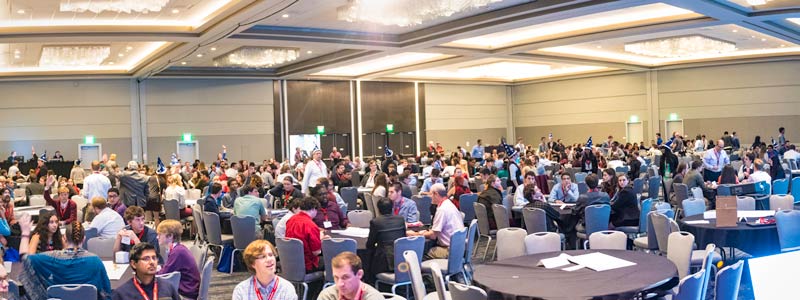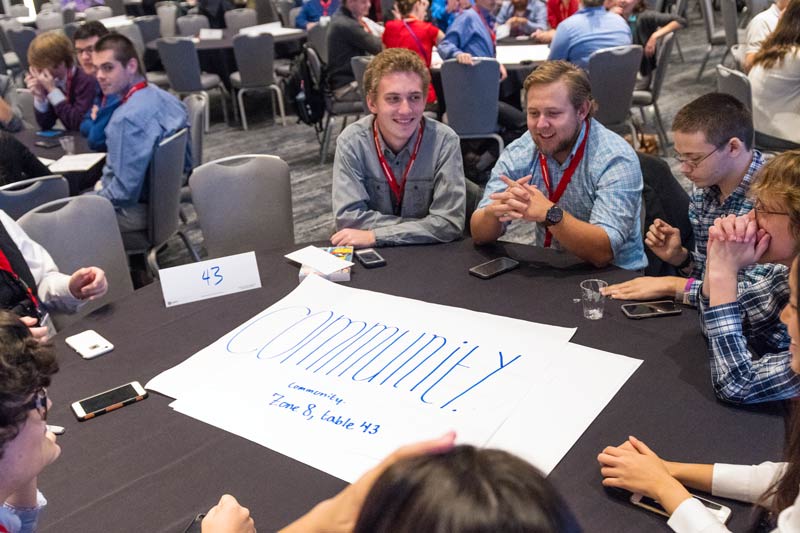Sigma Pi Sigma Physics Congress (PhysCon)
November 3, 2016 to November 5, 2016
San Francisco, CA
Meeting host: By:Andrew Hamilton, Grace Holling, Michael Wall and Daniel Parra
SPS Chapter:

PhysCon is about coming together and learning from others, so it only makes sense that a workshop titled “Put Congress in Action at Home” would show students how best to collaborate with and learn from diverse points of view.
William Degraffenried and Brad Conrad led in this session with the goal of creating a space where SPS members, regardless of zone and chapter, could intermingle, and collaboratively provide insight into each other’s issues. “No two chapters are the same, [and] that’s the beauty of SPS,” Degraffenried said.
The session started with extreme non-diversity, we were assigned to a table with other SPS members in the same zone.. “What are the important issues facing us?” Conrad asked. We wrote down every issue we could think of on a large sheet of paper, just to put it all on the table (literally). We wrote lighthearted things, like life, homework, and even physics itself, but we also wrote serious things, such as the lack of diversity in physics, the lack of early math preparation and the lack of great science/math teachers in middle and high school. The tone of the conversation was fun and loose, but the thoughts behind our words were deep and meaningful after we warmed up to each other..
We were then asked to hone in on two core issues. Our table chose the lack of early math preparation and lack of great early teachers. Next, we were asked to collectively as a table find a word that encompassed the way to overcome these issues. Ours was “perseverance.” We thought that our younger selves were put at a disadvantage because we didn’t have inspiring science teachers in our early years in school, and so to find ourselves studying physics in college, we had had to persevere against the odds.
This was all a setup for an even bigger and more memorable part of the workshop.
Envelopes were passed to each table, containing table numbers on little white slips. We were all split up and sent to different tables, and once we arrived, we were tasked with discussing the key issues each of us found at our tables.
The idea behind it all was so simple, yet so powerful. A fresh pair of eyes from one chapter to help weigh in on another’s issues. Some chapters were dealing with the same issues, some had never encountered another’s issues, and best--some chapters had solved and moved past another issue. Because we were split up both by zone and chapters, chances were that for each issue, there was at least one person representing a chapter who had solved the issue at hand. It was a stroke of statistical genius. Our table liked to dive in deep into each topic and problem, and as a consequence, didn’t get to everybody. But it didn’t matter, we all still grew and learned.

Almost in the same way that one can learn about a phenomenon by reading or in class, but only gain a true understanding by experiencing it, this workshop taught us all the simple but profound lesson that collaboration with diversity of mindsets is key to gaining effective and true insight. It’s even more key than having everyone willing and qualified. The lesson was the idea that having a geographically, ethnically, and scientifically diverse team was far better and more effective than having a team from the same place, race, and focus. The fantastic part of this workshop, which could not have been emphasized enough, was that we were literally able to see that for ourselves: That diversity of mind helps in the power of a team, and makes us all smarter and ready to solve the problems we face as an SPS member, a chapter, and as an organization as a whole.
Being given a theory and then experimenting with it to further our understanding is what this workshop was all about. Collaboration at first with zone-separated, chapter inclusive tables, then with random tables verified the theory that diverse modes of thinking as a result of geographical and scientific backgrounds leads to more effective work, in this case with the task of facing the issues that challenge all levels of SPS student chapters. With just a small but direct push, William Degraffenreid and Brad Conrad were able to show us that.